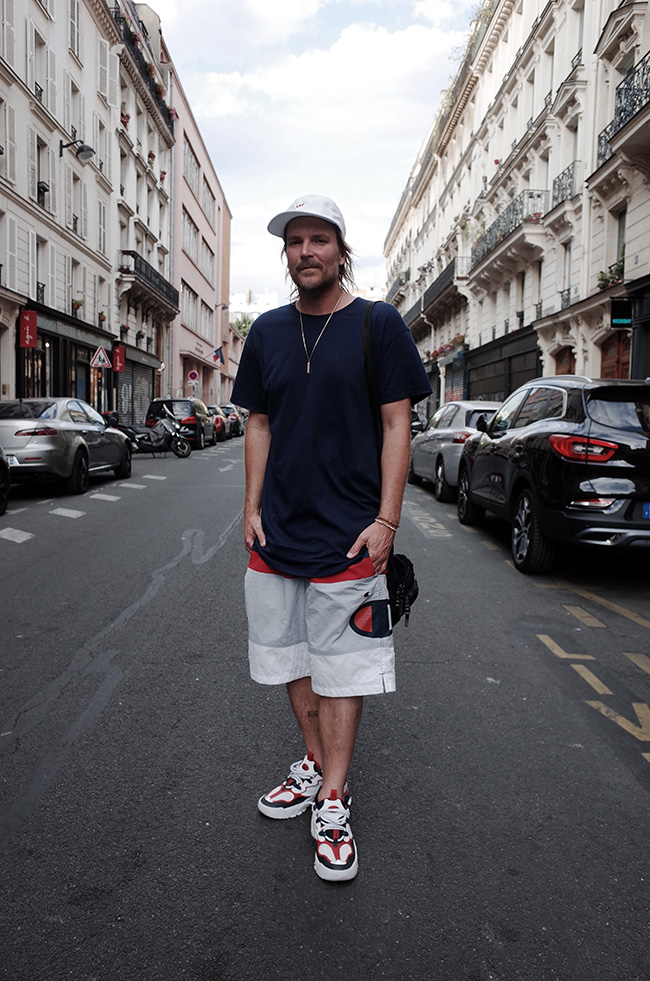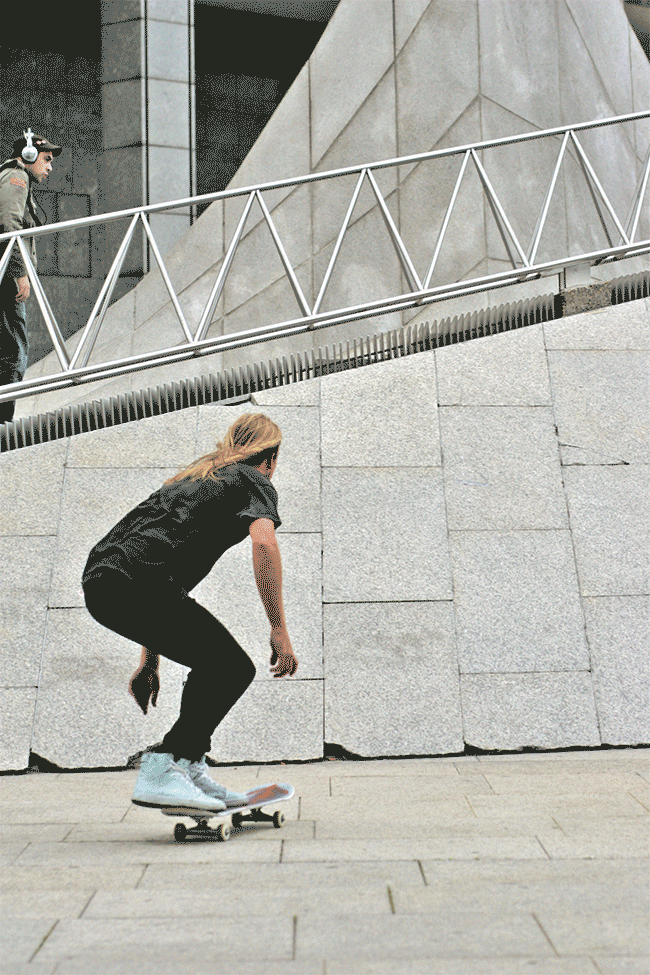Everybody knows The Muska is the nicest guy in the business. And The Muska knows about business. How much do you think The Muska made, back when he was at the top of his game? Expect some numbers in the following interview.
„PAY YOUR TAXES!“
Have you ever had a real job?
That would depend on what your definition of a real job is. Because I consider what I do a real job right now. Anything that you have to put your effort and time into and that you receive money for is a job. If I didn’t get paid for skateboarding, then it wouldn’t be a job. I understand your question but I also question your question, if that makes sense!
Ok, before skateboarding…
Before skateboarding, I had a couple odds and ends jobs, but mainly one real job if you want to call it that. That was in Las Vegas, and I’d work with concrete. My mom’s boyfriend would drive the semi-truck and we made huge concrete squares in the desert. They had huge machine for large scale production of concrete. Basically we were making concrete cubes in order to house electrical wiring inside, and water piping.
Tough job, I guess.
Pretty tough, yeah, in the Las Vegas desert! Real hot, dust storm all day long…
Maybe because it was tough it made you push yourself to try to get out of it.
Yeah, I think there’s a part of it for sure. I think beyond my job I just thought that there was something more for me in the world. That I was not in the right place. I wasn’t meant to stay where I was at.
When did you start getting paid for skateboarding?
The first time I got paid was 100$ from Maple Skateboards, in ’94 maybe. That was like a million dollars to me at that time! I thought I was rich! But I never had that expectation from skateboarding, I never went to California thinking « I’m gonna get paid to ride my skateboard ». I never even thought this was a possibility. I wanted to get free skateboards but I was ready to go work a job, or do something, you know…
But you knew pro skaters would exist back then, right?
For a skater you wouldn’t make a lot of money back then, skateboarding was dead! When I got to California and got dropped off on the beach, the skate industry was like (down – EN)… I knew that there was pro skaters but I never imagined that I could be one of those guys. I knew I could be sponsored, that was my goal, but I didn’t foresee anything that was about to happen.
So you weren’t sponsored before the move?
Kind of. But I broke my ankle very bad and they sorta said « call me when you’re better ». That was G&S skateboards. G&S turned into And Skateboards for a second and it became Maple. So Maple was kinda my first real sponsor. But it wasn’t until Toy Machine that I started to get ‘a lot of money’ which was 500$ a month! Ah ah ah!
How long did that last? 3-4 years?
I don’t even know if it was that long. It might have been a couple years but it felt like a lifetime! But at first there was no money, I remember getting like 300$ and when I turned pro I got maybe 500$ and that was a very big deal to me!
But you also got the shoe deals.
A little bit after. But there wasn’t a lot of money in the original shoe deal either until I got on Es and had my first shoe and started to see something that was more like ‘real money’!
Would you get royalties on the shoe?
Yes.
Can you tell how much money it was?
I honestly can’t remember, I swear if I could tell you I would say it…
Something like 10 grand a month?
Back then it was quarterly. So you got paid probably like a thousand or two thousands a month guaranteed and quarterly (the royalties- EN)… Because that shoe was only out for a year maybe so it wasn’t a whole lot of money… Maybe it was an average of 7 to 10 grand a month for 1 year, I honestly can’t remember.
What happened then?
I was approached to start my own company (Circa) so that was very interesting at that time because I had a lot of visions for design. And I thought that there was a lot of limitations with Es because it was Koston and some other people that were kind of like ahead of me a little bit, and I felt like I was behind them so the idea of starting something on my own, and building a team and create new designs, and logos, that was something I was very interested in doing. Just as much as I was interested in skateboarding I quickly grew an interest in graphic design, shoe design, clothing design, marketing, advertisement lay outs, building a team…
And it worked.
Yeah, it did. It worked well!
So that was the time when you made the most money in your career.
I would say so, the Circa days were definitely, and later with Supra it was good too. I designed the Skytop and that was a really good time in my life too, but definitely when I was balling the hardest if you wanna say so would be the Circa days because Shorty’s was doing really well at the time, Circa was doing well…
Ghetto child…
Ghetto child wasn’t making a lot of money, it was more a passion project. You don’t make too much money off wheels. But that was a good time of my life, financially.
Would you see instantly the sales raising when you would put out a part or something?
I think so. At that time a lot of your popularity depended upon your skateboarding video parts, so yeah, any time a video came out you would see an increase of board sales, shoe sales and if it wasn’t an increase it was solidifying the position that you were in. You wouldn’t see a decline, but usually the sales increases would be based around a new release of a product, I think… It’s been such a crazy long ride with so much happening in between so I try to remember the best as I can.
Back then, at the peak of you career, was the money topic something you would talk about with your team mates or would you just deal with your own stuff? I’m curious to see if everyone was on the same level, like Koston, Penny…
I think there was a lot of separation in what everybody was getting. It wasn’t spoken too much because everybody was getting different deals and everybody had their ability to negotiate in a different way. For instance, I never knew what Koston got when I was on Es. I never knew what they got… But when I started Circa, I was an owner as well and so I was behind the scenes too, then I started to see what was going on. For instance when Jamie Thomas got on I tried to get him the same deal I had because I believed in him and I believed he would bring the same amount to the table that I was bringing, in a different way, and to have sort of the best of both worlds in a way, where I was more viewed maybe to the hip hop fresh skaters and he kinda had the hardcore/rock’n roll/punk skaters and that whole Zero vibe. I know at that time I fought to give him the same deal but everybody in skateboarding, no matter how good your ability on a skateboard is, being a professional skateboarder is a lot more than your ability on a board, it’s your ability to connect with consumers, fans and skaters, for them to relate to you and maybe make them want to emulate your style or be like that person…
I think it has changed a little bit now, especially with the Olympics and stuff.
Yeah, it has changed a lot! I also think that it would come full circle. Right now we might be focused on your ability and how many tricks you can do in a row and all this stuff but if you start and look at the Industry: there are so many great skateboarders, at some point it’s gonna have to come back to style. And I think it is happening right now…
It’s splitting, actually.
Yeah, and not just 2 splits, maybe four! There’s a lot of different things, you have the olympics, Street League and that whole kind of world, then you have hardcore street skaters, instagram famous kind of people, then you have bowl slashers and vert, pool, old school… Skateboarding is so big that it’s not only one thing leading the entire industry anymore. There’s a lot of things, a lot of room for opportunity and for you to present what you believe skateboarding is. If there is some truth within what you belief is, there will be people that will identify with that and gravitate towards.
But it might have been easier 20 years ago because there was still a lot to do when nowadays it seems like it has all been done.
It’s over saturated too because it’s accessible, it’s easy for anybody to start their own company. What’s a company? To print some logo on a t-shirt? You print one board and you have a company! I think the accessibility to manufacturing and printing has led to an over-saturation… I could sit here and try to talk about it and explain for the rest of my life of what I think is happening, but nobody knows what is happening in our Industry right now. That’s why you’d better off of just doing what you love and if somebody identifies with it that’s good and if not… get another job! This is where it gets difficult for the hardcore skaters, but see the popularity and influence that skateboarding has on the world, then you should be able to take the knowledge that you have about skateboarding and bring it to other aspects of marketing, even if it’s for some corporation that you may not love, but sometimes you have to do these things that you don’t love a hundred percent in order to fund the things that you do love. Does that make sense?
1999
Sure! What is the biggest amount of money you ever got, at once?
I don’t want to say the specific number amount because I don’t feel confortable saying it. I’d say that I made good money off skateboarding, but I also made a lost of mistakes with my money because I didn’t have anybody to give me the guidance that I needed to… you know… And a lot of skateboarders are gonna make the same mistakes because we don’t have the taxes we’ve held from our money. So if you give a kid a candy bar and tell him he’s only allowed to eat half of it, the kid’s gonna eat the whole candy bar! Ah ah! I ate the whole candy bar!
It came back to you?
Yeah, I had to pay taxes! Two times in my life I was hit real hard with the tax scenario. But I finally lived and learned and got a business manager. That’s something that I’d love to give advice to kids.
I’m pretty sure 90% of the pro skaters don’t deal with that.
Yeah… And it will come back to haunt you! It really will! That’s advice I would give kids the most: if you’re getting paid for skateboarding, understand that you owe taxes and pay them quarterly. Because it’s easier to pay this little amount spread out through a long time than it is to accumulate and all of a sudden your skateboarding checks stop coming and the government gets on you. I don’t know how if it’s the same here…
It is the same.
I can only speak for the American laws but all I can say to kids is: pay your taxes.
Back in the Es days, no one had a manager, so you were dealing with the contracts yourself, no one was looking through them or anything?
No! Crazy! Now I have a lawyer, a business manager… Back then, I was like: « I’m not paying this person money to do this », « they’re trying to take my money from me » but in reality they would have solidified it way more, and wouldn’t allow you to be taken advantage of. That’s something that happens very frequently in skateboarding. It’s sad because the skateboard Industry acts like it’s you best friend when you’re a talented skateboarder and on your rise to the top. You’re gonna have a lot of best friends that are gonna shake your hands and tell you everything you want to hear but as soon as your career starts to go down, those same ‘best friends’ are not gonna be around. I don’t want to put a negative light on skateboarding but I also don’t want to sugar coat it and not present the reality of what it is.
Being a skateboarder’s agent wasn’t even a job back then.
Yeah, but I still never had an agent, only a lawyer to over see the contracts and a business manager to over see my finances. But maybe someday I’ll get an agent, it’s not too late! Tony Hawk probably never got an agent until way later in life and it worked out pretty good for him.
Do you still live 100% off skateboarding today?
Yes, but I guess it’s loose because I’m not only a skateboarder, I’m a designer, a photographer, a marketing director. I do all these things for Supra. That is a real job! A lot of people think that I’m living off my legacy but if I only skateboarded, I’d probably had been gone a long time ago.
Interview recorded in Paris, June 2019.


